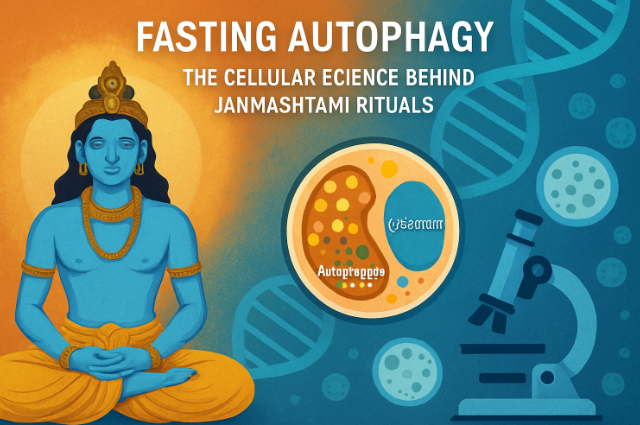
Autophagy
The term autophagy is derived from Greek words which is a combination of self devouring. Auto means self, and Phagomai means to eat.
Autophagy allows your body to break down and recycle old cell parts so your cells can operate more efficiently. It’s a natural cleaning-out process that begins when your cells are stressed or deprived of nutrients. Researchers are studying autophagy’s role in potentially preventing and fighting disease.
Autophagy is your body’s process of reusing old and damaged cell parts. Cells are the basic building blocks of every tissue and organ in your body. Each cell contains multiple parts that keep it functioning. Over time, these parts can become defective or stop working. They become litter, or junk, inside an otherwise healthy cell. Autophagy is your body’s cellular recycling system. It allows a cell to disassemble its junk parts and repurpose the salvageable bits and pieces into new, usable cell parts. A cell can discard the parts it doesn’t need. It’s a quality control for your cells.
Significance of Autophagy
Autophagy plays a significant role in each cell and survival and function. According to the study, states that autophagy is a crucial process that requires 12-36 hours of complete fasting.
- It recycles damaged cell parts into a fully functioning cell.
- It eliminates the cell that takes up space and slows performance.
- Destroys pathogens in a cell that can damage it, like viruses and bacteria.
- Autophagy plays an important role when it comes to aging and longevity, too. As a person ages, autophagy decreases, which can lead to a buildup of cellular junk parts, and in turn, cells that aren’t functioning at their best.
Autophagosomes carry the junk cell pieces to a part of the cell called a lysosome. A lysosome's job is to digest or break down other cell parts. Lysosomes eat the junk cell parts and then release the reusable bits and pieces. The cells use these raw materials to make new parts.
Factors inducing autophagy
You can induce autophagy by stressing your cells to send them into survival mode. You can induce autophagy through.
Fasting is when you stop eating for a certain period of time. It deprives your body of nutrients, forcing it to repurpose cell components to function.
Calorie restriction is restricting your calories, meaning decreasing the number of energy units, or calories, your body consumes. Instead of depriving your body of calories completely, you can limit them. This forces your cells into autophagy to compensate for the lost nutrients.
Swapping with a high-fat and low-carb diet, this type of diet, commonly referred to as a keto diet, changes the way your body burns energy, so that instead of burning carbs or sugar for energy, it burns fat instead. This switch can trigger autophagy.
Exercise, Exercises stimulates processes that increase the activity of ATGS, such as stressing your skeletal muscles. Exercises can induce autophagy, depending on the type of exercise you’re doing and its intensity.
Fasting
Hindu Dharma or Santhana Dharma is nothing but living a spiritual way of life. Fasting is a common practice and a principle that is believed to create and develop awareness with God, which is followed in the religions of Hinduism. Islam and Christianity. Our puranas and holy books have lost stories related to the spiritual benefits of this fasting.
- Fasting is Good for the upliftment of spiritual, mental, physical, and emotional strength.
- It is a spiritual act to acquire divine grace.
- It prepares and purifies the mind and prepares the body for austerities.
- Fasting is an art of sacrifice, in which a devotee sacrifices food and hunger to God, as a mark of faith and devotion.
- It cleanses body and soul.
- It aims to boost stamina and nourish physical health for long life.
- To train the mind and to strengthen the body to endure and to face difficulties, and not to give up.
- It acts as a penance for Hindus, as it provides an opportunity to escape from sins.
Religious fasting and vascular health
Three major discussion points stood out at first: how did the Indian medicine influence the modern Western medicine, and cardiology in particular? Prof. Narula claimed that even the name heart was derived from Hridaya, which conveyed a complete physiological meaning, comprising 3 verbs: Hru for harati(to receive or abduct), Da for dadati (to donate), and ya for Yayati (control through self-generated rhythmicity). The second discussion point was about the relevance of upavasa, practiced in India for thousands of years. Prof Narula highlighted a potentially strong association of fasting with exaggerated release of endothelial progenitor cells and consequently superior vascular health. The circulating levels of endothelial progenitor cells are manifold greater in women of reproductive age, offering them protection against endothelial injury and rendering them, to be more resilient against heart disease. He discussed the third point, with a discussion of global religious practices and the basis of improved vascular health resulting from fasting.
Types of fasting
Hindus all over India will observe fasting on different occasions, on certain days such as the month such as Purnima, Ekadasi, and during some festivals like Navratri, Ganesh Chaturthi, Janmashtami, Shivratri, and Karwa Chauth. Another common fasting is known as phalahar, which means to eat fruits during the daytime before Sunset and skipping the night meal. Even Muslims have an effect of 30-day Ramadan fasting related to autophagy.
Janmashtami fasting practices
Janmashtami is a gracious occasion, which is celebrated for Lord Krishna, and devotees observe a fasting method that involves a fruit and milk-based diet. The food and water will be restricted, which creates a break from regular eating patterns. The period of fasting can be up to 12-13 hours, where autophagy is produced, and if it’s for 24 hours can be more pronounced. It can bring cellular benefits like DNA repair, active metabolism for better overall function, and cellular rejuvenation.
References
